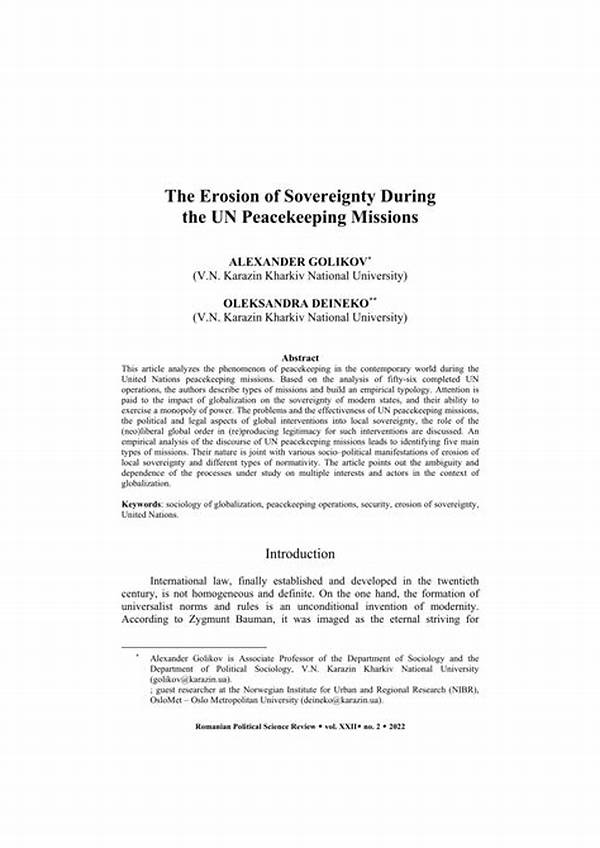The interplay between peacekeeping missions and national sovereignty represents a pivotal discourse within international relations. Peacekeeping operations, undertaken by international organizations such as the United Nations, have the primary aim of maintaining or restoring peace in regions experiencing conflict. However, the sovereignty of states—a fundamental principle of international law—raises intriguing questions about the extent and limits of external intervention. This balance between fostering peace and respecting sovereignty demands careful consideration and diplomatic finesse.
Challenges in Balancing Peacekeeping and Sovereignty
Peacekeeping missions are frequently deployed in conflict zones to prevent and mitigate violence, providing a neutral buffer that facilitates negotiation and peace processes. Yet, these interventions can be perceived by host nations as an encroachment on national sovereignty. Such missions operate under mandates that require host nation consent; however, the practical realities on the ground can complicate these agreements, often leading to tensions between respecting sovereignty and ensuring effective peacekeeping operations. The effectiveness of peacekeeping missions, therefore, is contingent upon a nuanced understanding of the host country’s domestic and political landscape.
Moreover, maintaining the legitimacy of peacekeeping missions involves respecting the principle of national sovereignty while achieving mission objectives. The presence of international forces on sovereign soil necessitates transparency, clear communication, and collaboration with national governments. These components are crucial in upholding the integrity of peacekeeping initiatives and ensuring that they are perceived as support mechanisms rather than as infringements on a nation’s autonomy. Thus, peacekeepers must navigate a complex matrix of diplomatic interactions, which requires sensitivity to political, cultural, and historical contexts.
The Role of International Organizations
1. International organizations promote peacekeeping missions to support countries in conflict, yet these actions must balance with respecting national sovereignty to prevent perceptions of unwarranted interference.
2. Peacekeeping missions are often perceived as crucial interventions, yet the protection of national sovereignty requires cautious navigation to ensure that these missions do not undermine local authorities.
3. The mandate of peacekeeping missions necessitates collaboration with national governments, emphasizing the protection of national sovereignty while pursuing peace and stability.
4. Peacekeeping missions rely on the cooperation of host nations, highlighting the need for respect for national sovereignty to ensure operational effectiveness and reduce tensions.
5. Challenges arise when peacekeeping missions intersect with national sovereignty, requiring strategies that prioritize diplomatic engagement and consensus-building to foster sustainable peace.
Legal Implications of Peacekeeping
The relationship between peacekeeping missions and national sovereignty is deeply enmeshed within the legal framework of international law. The United Nations Charter emphasizes the importance of sovereignty, territorial integrity, and political independence of states. Yet, the same Charter provides mechanisms for international intervention in situations where peace and security are threatened. This coexistence of principles necessitates careful legal interpretation when deploying peacekeeping forces.
Peacekeeping operations are often mandated under Chapter VI or VII of the UN Charter. Chapter VI emphasizes peaceful resolution of disputes and typically requires host country consent, while Chapter VII permits enforcement actions without consent, in cases of threats to peace. The decision between these mandates reflects on the international community’s approach to national sovereignty, requiring strategic judgment to balance intervention with respect for state autonomy. These legal considerations underpin the deployment and operation of peacekeeping missions worldwide, necessitating rigorous adherence to both international norms and the sovereignty of affected nations.
Operational Dynamics of Peacekeeping Missions
Peacekeeping missions are complex undertakings that encompass various operational aspects. Effective mission execution necessitates adherence to international standards while respecting national sovereignty. The logistical coordination of troops, humanitarian assistance, and administrative support must align with the host nation’s legal frameworks and cultural norms. The delicate balance between exerting influence and maintaining respect requires peacekeepers to engage with diverse stakeholders, including government entities, civil society, and local communities.
Furthermore, the success of peacekeeping missions is contingent upon robust frameworks that govern their operation, clarity in mandates, and resolute adherence to non-partisanship. These dynamics underscore the importance of multidimensional strategies, which encompass military, political, and humanitarian elements. Such strategies aim to create an environment conducive to sustainable peace while preserving the sanctity of national sovereignty. Consequently, peacekeeping efforts must continually adapt to both global regulations and local realities to achieve their objectives effectively.
Impacts of Peacekeeping Missions on Host Nations
The impact of peacekeeping missions on host nations is profound, with implications for both peace and sovereignty. While these missions strive to facilitate stability and security, their presence can lead to concerns about potential erosion of national sovereignty. Host nations may experience a complex interplay of support and apprehension towards international involvement.
Peacekeeping operations contribute to rebuilding national institutions and fostering governance structures that are resistant to conflict. However, aligning these efforts with national sovereignty requires comprehensive engagement strategies that build trust and cooperation with local authorities. The shared goal of sustainable peace mandates that peacekeeping missions function as allies in reinforcing domestic capacities rather than replacing intrinsic national functions. Therefore, a balanced approach is essential to realizing the dual objectives of conflict resolution and sovereignty preservation in host nations.
Conclusion: Navigating Sovereignty in Peacekeeping
The summary of peacekeeping missions and national sovereignty involves a discerning appreciation of the complexities inherent in international interventions. The primary intent of peacekeeping operations is to promote peace while ensuring that the sovereignty of host nations remains uncompromised. This undertaking mandates an intricate balance of assertive action and diplomatic restraint, guided by international legal standards and respect for state autonomy.
Strategies to enhance the effectiveness of peacekeeping missions necessitate astute diplomatic engagement, respect for national sovereignty, and the endorsement of localized solutions. As international organizations continue to navigate these dynamics, the enduring challenge remains to uphold the integrity and objectives of peacekeeping missions while respecting the sovereignty of nations. This imperative dialogue forms a cornerstone of contemporary international relations, highlighting the perennial need for cooperation, transparency, and respect among the global community for sustained peace and security.





